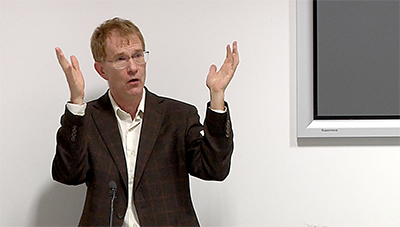Professor Shaun Nichols - 12 March 2015 - What is the Nature of Human Morality?
Duration: 60 mins
Share this media item:
Embed this media item:
Embed this media item:
About this item

| Description: |
What is the Nature of Human Morality?
Professor Shaun Nichols (Arizona) Abstract Prof Nichols: Philosophical observation and psychological studies indicate that people draw subtle distinctions in the normative domain. But it remains unclear exactly what gives rise to such distinctions. On one prominent approach, emotion systems trigger non-utilitarian judgments. The main alternative, inspired by Chomskyan linguistics, suggests that moral distinctions derive from an innate moral grammar. We develop a rational learning account. We argue that the “size principle”, which is implicated in word learning (Xu & Tenenbaum 2007), can also explain how children would use scant and equivocal evidence to interpret candidate rules as applying more narrowly than utilitarian rules. Shaun Nichols is a Professor of Philosophy at the University of Arizona. A pioneer of the emerging discipline of ‘experimental philosophy’, Prof Nichols is interested in the psychological processes underlying our everyday moral intuitions, moral reasoning and moral decision-making – and in how understanding these processes can shed light on classic and contemporary questions in morality and ethics. More specifically, his research has brought an empirically-informed lens to bear on a range of philosophical questions including free will, moral responsibility and blameworthiness, and notions of self and personal identity. He is author of three edited volumes and two books (Sentimental Rules and Mindreading), and has been published in such prestigious journals as Mind and Language and the Journal of Philosophy. |
|---|
| Created: | 2015-03-17 08:55 |
|---|---|
| Collection: | Moral Psychology Research Group |
| Publisher: | University of Cambridge |
| Copyright: | Glenn Jobson |
| Language: | eng (English) |
| Keywords: | CRASSH; Moral Psychology; Shaun Nichols; |
| Abstract: | What is the Nature of Human Morality?
Professor Shaun Nichols (Arizona) Abstract Prof Nichols: Philosophical observation and psychological studies indicate that people draw subtle distinctions in the normative domain. But it remains unclear exactly what gives rise to such distinctions. On one prominent approach, emotion systems trigger non-utilitarian judgments. The main alternative, inspired by Chomskyan linguistics, suggests that moral distinctions derive from an innate moral grammar. We develop a rational learning account. We argue that the “size principle”, which is implicated in word learning (Xu & Tenenbaum 2007), can also explain how children would use scant and equivocal evidence to interpret candidate rules as applying more narrowly than utilitarian rules. Shaun Nichols is a Professor of Philosophy at the University of Arizona. A pioneer of the emerging discipline of ‘experimental philosophy’, Prof Nichols is interested in the psychological processes underlying our everyday moral intuitions, moral reasoning and moral decision-making – and in how understanding these processes can shed light on classic and contemporary questions in morality and ethics. More specifically, his research has brought an empirically-informed lens to bear on a range of philosophical questions including free will, moral responsibility and blameworthiness, and notions of self and personal identity. He is author of three edited volumes and two books (Sentimental Rules and Mindreading), and has been published in such prestigious journals as Mind and Language and the Journal of Philosophy. |
|---|---|
Available Formats
| Format | Quality | Bitrate | Size | |||
|---|---|---|---|---|---|---|
| MPEG-4 Video | 1280x720 | 2.95 Mbits/sec | 1.30 GB | View | Download | |
| MPEG-4 Video | 640x360 | 1.75 Mbits/sec | 790.90 MB | View | Download | |
| WebM | 1280x720 | 1.85 Mbits/sec | 832.84 MB | View | Download | |
| WebM | 640x360 | 608.87 kbits/sec | 267.57 MB | View | Download | |
| iPod Video | 480x270 | 497.89 kbits/sec | 218.80 MB | View | Download | |
| MP3 | 44100 Hz | 252.63 kbits/sec | 111.02 MB | Listen | Download | |
| Auto * | (Allows browser to choose a format it supports) | |||||

